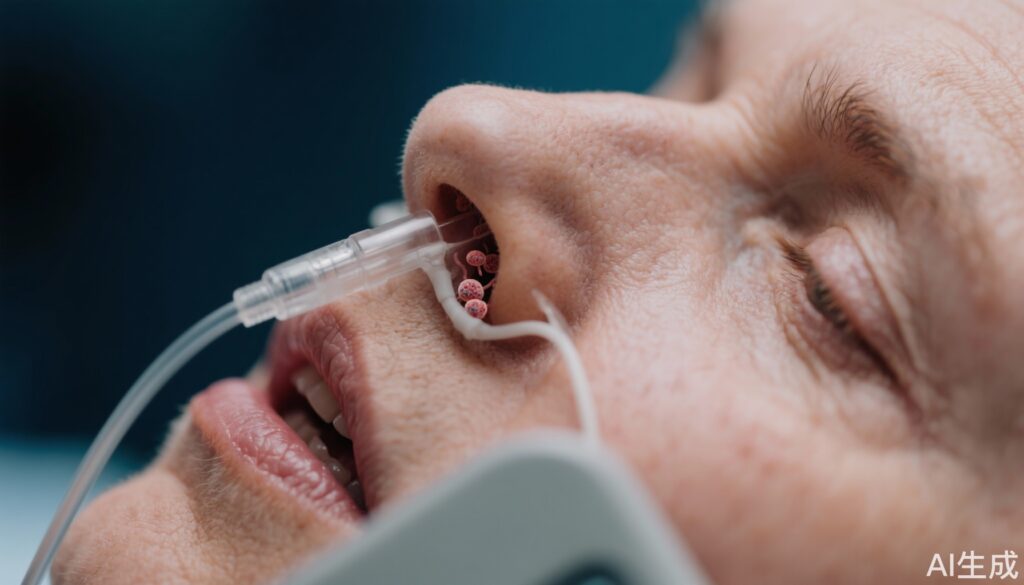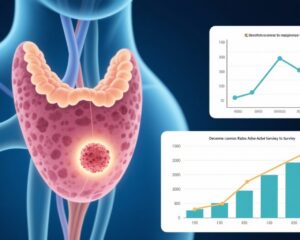Highlight
– Acute radiation oral mucositis (AROM) is a significant dose-limiting toxicity in nasopharyngeal cancer (NPC) radiotherapy.
– Bacterial decolonization (BD) with mupirocin nasal ointment substantially reduces the incidence of severe (grade ≥3) AROM.
– BD also improves patients’ quality of life by decreasing oral pain and swallowing difficulties during radiotherapy.
– Mupirocin effectively lowers Staphylococcus aureus colonization rates in both nasal and oral mucosa.
Study Background and Disease Burden
Nasopharyngeal carcinoma (NPC) is a malignancy endemic in certain regions such as southern China, where radiotherapy combined with chemotherapy remains the definitive treatment. A major complication limiting treatment efficacy and patient compliance is acute radiation oral mucositis (AROM), characterized by painful inflammation and ulceration of the oral mucosa induced by radiotherapy. Severe (grade ≥3) AROM adversely affects oral intake, quality of life, and may necessitate radiation dose reductions or treatment interruptions. Despite advancements in supportive care, effective preventive strategies for AROM remain an unmet clinical need. Emerging evidence suggests that bacterial colonization, particularly with Staphylococcus aureus, can exacerbate mucosal injury and inflammation. Therefore, bacterial decolonization (BD) targeting S. aureus emerges as a promising approach to mitigate severe AROM and improve patient outcomes.
Study Design
This open-label, single-center, phase 3 randomized clinical trial conducted in China enrolled 176 patients with NPC scheduled for definitive chemoradiotherapy between July 2023 and February 2024. Patients were randomized 1:1 to receive either bacterial decolonization (BD) intervention or standard of care (SoC). The BD group applied mupirocin nasal ointment twice daily for three days before radiotherapy, then for five consecutive days followed by a one-week break, repeated cyclically throughout radiotherapy. The control group received routine nasal and oral care. The primary endpoint was the incidence of severe (grade ≥3) acute radiation oral mucositis assessed by blinded independent evaluators. Secondary endpoints included quality of life measured by the Quality-of-Life Questionnaire-Head and Neck 43 (QLQ-H&N43) and colonization levels of S. aureus in nasal and oral mucosa.
Key Findings
Of the 176 participants (mean age 52.1 years; 23.9% female), 88 received BD and 88 SoC. Severe AROM incidence was significantly lower in the BD group at 22.7% (20/88) compared to 47.7% (42/88) in the SoC group, yielding a relative risk reduction of 52% (relative risk, 0.48; 95% CI, 0.31–0.74; P < .001). Multivariable logistic regression confirmed BD’s protective effect with an odds ratio of 0.27 (95% CI, 0.13–0.54; P < .001).
Quality of life analyses showed that BD patients experienced significantly lower symptom severity during radiotherapy, with median pain scores reduced by half compared to SoC (25.0 vs 50.0; interquartile range [IQR] 25.0–50.0 vs 25.0–50.0) and fewer swallowing difficulties (median 8.3 vs 33.3; IQR 8.3–33.3 in both groups).
Microbiological assessment revealed significantly reduced nasal and oral colonization of S. aureus at radiotherapy completion in the BD versus SoC groups: nasal colonization was 9.4% versus 22.9%, and oral colonization was 5.9% versus 20.5%, respectively.
Safety outcomes were consistent with prior mupirocin use profiles, with no unexpected adverse events reported. Treatment adherence was high, supporting the regimen’s feasibility.
Expert Commentary
This landmark trial provides compelling evidence supporting bacterial decolonization with mupirocin nasal ointment as an effective, well-tolerated strategy to mitigate severe AROM in NPC patients undergoing chemoradiotherapy. The correlation between reduced S. aureus colonization and mucositis severity supports a plausible mechanistic link whereby reduction of bacterial burden decreases inflammatory exacerbation of radiation injury.
While the open-label design introduces potential biases, the blinded mucositis assessment strengthens result validity. Single-center recruitment in China may limit generalizability, necessitating validation in diverse populations and multi-institutional settings. Additional studies could investigate whether oral mupirocin or other antimicrobial strategies might further enhance mucositis prevention.
Microbial management as a novel adjunct in oncology symptom control represents a promising area for translational research, potentially applicable to other radiation-induced toxicities. Incorporation of microbiome profiling may refine personalization of such approaches.
Conclusion
This phase 3 trial solidifies the role of mupirocin-based bacterial decolonization in preventing severe acute radiation oral mucositis among nasopharyngeal cancer patients receiving chemoradiotherapy. The significant reduction in mucositis severity and improvement in quality of life, alongside decreased S. aureus colonization, underscore the therapeutic and mechanistic significance of microbial intervention. This cost-effective approach has practical implications for improving treatment tolerance and outcomes in NPC. Further studies to confirm and expand these findings are warranted to fully integrate microbial management strategies into radiation supportive care protocols.
References
Liao Z, Xiong X, Zhao L, et al. Bacterial Decolonization With Mupirocin Ointment for Acute Radiation Oral Mucositis Prevention: A Phase 3 Randomized Clinical Trial. JAMA Oncol. 2025 Aug 7:e252361. doi: 10.1001/jamaoncol.2025.2361. Epub ahead of print. PMID: 40773220; PMCID: PMC12332761.
National Cancer Institute. Common Terminology Criteria for Adverse Events (CTCAE) v5.0. 2017.
NCCN Clinical Practice Guidelines in Oncology: Head and Neck Cancers. Version 2.2025.
Patton LL, Spencer P, Yee BD. Management of oral mucositis: a review of current therapies and potential new agents. Oral Oncol. 2023;138:106424.


